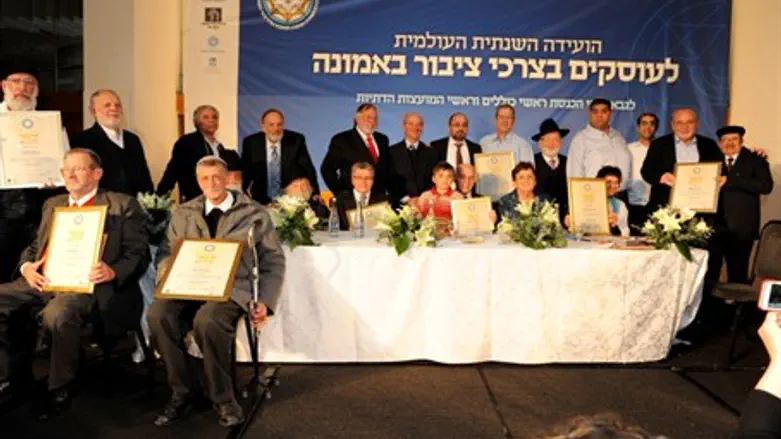
Hundreds of synagogue gabbais (sextons), heads of religious local authorities and rabbis from Israel and around the world participated in a special conference in Jerusalem on Sunday evening.
The conference was organized by the Besheva group, which includes the weekly Hebrew newspaper Besheva as well the Arutz Sheva website. Other co-organizers included the Israeli Chief Rabbinate and the Union of Synagogues in Israel.
At the center of the conference was a call by the synagogue leaders to open the gates of the synagogues to the general public.
“Synagogues must open to everyone, and the gabbais and community members should invest in an endless effort for unity among the people of Israel,” Dudu Saada, the chair of the Besheva group, said during the conference. “This is an important call which unfortunately is not obvious to many people in Israel. This perception must be changed from its foundation.”
Rabbi Avichai Katzin, Dean of Beit Midrash Reisheet in Ra'anana, spoke of a feeling of alienation among many secular visitors to the synagogues, which he said must be changed by connecting the public to the synagogue and making the synagogue service accessible and user-friendly to those who are unfamiliar with the liturgy.
The participants in the conference brought forth ideas for new projects that would be implemented in the coming year, in Israel and in Jewish communities worldwide, in order to connect the secular public to the religious public and give access to synagogues to the population at large. Israel's Sephardic Chief Rabbi, Rav Shlomo Amar, joined the call and noted that the synagogue is a place of brotherhood and friendship between all parts of the nation, and that hearts must be opened for the unity of Israel.
The climax of the evening was the handing out of awards to selected gabbais from across the country in recognition of their leadership. Among those gabbais who were selected following the recommendations of a special committee headed by the Chief Ashkenazi Rabbi, Rav Yona Metzger, were also two women. The two are Nitza Smilansky of Kibbutz Ein Harod and Tikva Tzemah-Shavit from Kibbutz Ayelet Hashachar, both secular kibbutzim which have had active synagogues for years, as part of their desire to maintain Jewish tradition.
The Kibbutz synagogues hold prayer services for those members who wish to pray. Bar Mitzvah ceremonies are held for children, classes are held for the entire public, and other activities revolving the Jewish life cycle are held throughout the year.
